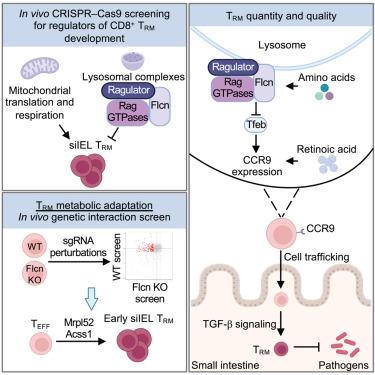CRISPR 筛选揭示了影响肠组织驻留记忆 CD8+ T 细胞形成的营养依赖性溶酶体和线粒体节点
IF 26.3
1区 医学
Q1 IMMUNOLOGY
引用次数: 0
摘要
营养供应和细胞器生物学指导着组织的稳态和细胞的命运,但这些过程如何协调组织免疫仍未明确。在这里,我们利用体内 CRISPR-Cas9 筛选,发现了影响 CD8+ 组织驻留记忆 T(TRM)细胞发育的细胞器信号传导和代谢过程。TRM细胞依赖线粒体翻译和呼吸。相反,三个营养依赖性溶酶体信号节点--Flcn、Ragulator 和 Rag GTPases抑制了肠道 TRM 细胞的形成。缺乏这些分子或氨基酸会激活转录因子 Tfeb,从而将营养压力与 TRM 的形成联系起来。此外,Flcn的缺乏促进了小肠中TRM细胞的保护性反应。从机理上讲,Flcn-Tfeb轴抑制了维甲酸诱导的CCR9表达以促进迁移和转化生长因子β(TGF-β)介导的细胞系分化程序。基因相互作用筛选显示,线粒体蛋白Mrpl52能促进TRM细胞的早期形成,而Acss1则能在Flcn缺乏相关溶酶体失调的情况下控制TRM细胞的发育。因此,营养物质、细胞器信号传导和代谢适应之间的相互作用决定了组织免疫力。本文章由计算机程序翻译,如有差异,请以英文原文为准。

CRISPR screens unveil nutrient-dependent lysosomal and mitochondrial nodes impacting intestinal tissue-resident memory CD8+ T cell formation
Nutrient availability and organelle biology direct tissue homeostasis and cell fate, but how these processes orchestrate tissue immunity remains poorly defined. Here, using in vivo CRISPR-Cas9 screens, we uncovered organelle signaling and metabolic processes shaping CD8+ tissue-resident memory T (TRM) cell development. TRM cells depended on mitochondrial translation and respiration. Conversely, three nutrient-dependent lysosomal signaling nodes—Flcn, Ragulator, and Rag GTPases—inhibited intestinal TRM cell formation. Depleting these molecules or amino acids activated the transcription factor Tfeb, thereby linking nutrient stress to TRM programming. Further, Flcn deficiency promoted protective TRM cell responses in the small intestine. Mechanistically, the Flcn-Tfeb axis restrained retinoic acid-induced CCR9 expression for migration and transforming growth factor β (TGF-β)-mediated programming for lineage differentiation. Genetic interaction screening revealed that the mitochondrial protein Mrpl52 enabled early TRM cell formation, while Acss1 controlled TRM cell development under Flcn deficiency-associated lysosomal dysregulation. Thus, the interplay between nutrients, organelle signaling, and metabolic adaptation dictates tissue immunity.
求助全文
通过发布文献求助,成功后即可免费获取论文全文。
去求助
来源期刊

Immunity
医学-免疫学
CiteScore
49.40
自引率
2.20%
发文量
205
审稿时长
6 months
期刊介绍:
Immunity is a publication that focuses on publishing significant advancements in research related to immunology. We encourage the submission of studies that offer groundbreaking immunological discoveries, whether at the molecular, cellular, or whole organism level. Topics of interest encompass a wide range, such as cancer, infectious diseases, neuroimmunology, autoimmune diseases, allergies, mucosal immunity, metabolic diseases, and homeostasis.
 求助内容:
求助内容: 应助结果提醒方式:
应助结果提醒方式:


